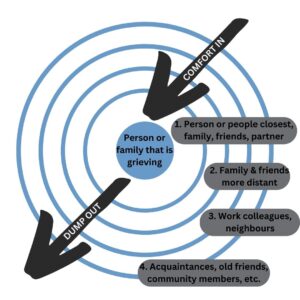Posts Tagged ‘Support’
Craig – Grieving as a Single Parent
Craig – Grieving as a Single Parent
In this video, Craig talks about the challenges of grieving as a single parent. He shares his own experiences and offers advice on how to cope with grief, talk to your kids about what’s happening, and ask for help from others.This video is for any single parent who is grieving the loss of a loved one. It is also for anyone who knows a single parent who is grieving and wants to offer support.
Ripples of Grief: Supporting Ourselves, Others, and our Communities After a Death
By Jessica Milette, MSW, RSW
When death knocks on the door of a community, each of us are impacted. Sometimes a death will touch many lives across a community, whether people knew the deceased personally or not. We may grieve the death of a family member, friend, or acquaintance, a well-known community member, or someone we are linked to by age, location, circumstances, etc. Community grief can feel overwhelming – we must tend to our own grief, but others in our life are grieving and hurting too. Each person in a community will grieve differently depending on their relationship to the person who has died, their own prior experiences of loss, and the unique coping strategies they rely on in grief.
Developed by psychologist Susan Silk and Barry Goldman following Susan’s experience with a health crisis and her diagnosis with breast cancer, Ring Theory helps us learn how to support others and ourselves when a community death occurs.
Like a ripple on water when we drop a pebble into it, imagine a series of concentric circles. Those directly impacted by the crisis or death are in the innermost ring, with each outer ring consisting of those further removed from the crisis or death. Generally the immediate family, or those who lived with the deceased,are in the innermost ring, with close friends and other family in the next ring, co-workers and acquaintances in the next ring, and those in our greater community in the outer rings.
When someone experiences a death, those in outer rings pour comfort in, while those in inner rings are allowed to “dump” their thoughts or feelings out. When someone in an inner ring is dumping out their feelings, those in outer rings can show up with acceptance and care, listening and validating the person’s experiences.

Pouring comfort in can also be the offer of specific, practical help. This approach seeks the griever’s consent to accept specific support and comfort, it lets the griever say yes or no to the offer, and can confirm what kinds of support are most helpful to them. It’s important to offer support on the griever’s terms.
When a community faces loss, many who are impacted want to share their feelings about the loss. Susan recalled during her cancer treatment how some folks she did not have very close relationships with in her community would show up unannounced, forcing her to accept support, or people would talk about their own feelings about her diagnosis. Dumping feelings onto someone in an inner circle is not helpful. It can leave those experiencing the loss most personally as if their loss is unacknowledged. When we know which ring we sit in after a death, we can connect to our own outer rings anytime we need to tend to our feelings of grief. If we find ourselves thinking about reaching out for support from someone who is in an inner circle compared to our relationship to the deceased, we should take a step back. Is there someone else that may be located in the same ring as us, or someone in a ring outside of us that we can reach out to instead? Sometimes actually drawing out the rings of folks in our own life impacted by a death can clarify where we need to support others, and who we can connect with for our own support.
Whether supporting others, or seeking support ourselves, a helpful phrase may be “Would you like to be heard, helped, or hugged?” Being heard means receiving supportive listening and validation. Being helped may mean brainstorming and collaborative problem-solving, or providing specific practical help with tasks. Sometimes there are no words or help we can offer, but, if welcome, our steady presence and a comforting hug can communicate our support.
Each person in a community will be impacted differently by a community death. It’s important to remember this theory about who we need to pour comfort into, and who we ourselves can dump out to as we navigate a community loss.
Articles Reviewed for Blog Post:
https://karenwulfson.com/wp-content/uploads/2013/04/How-not-to-say-the-wrong-thing1.pdf
https://www.latimes.com/opinion/op-ed/la-xpm-2013-apr-07-la-oe-0407-silk-ring-theory-20130407-story.html (actual article in LA Times first written by Susan Silk – first link is PDF version of same article)
https://www.psychologytoday.com/ca/blog/promoting-hope-preventing-suicide/201705/ring-theory-helps-us-bring-comfort-in
Jim – Significant incidents
Jim – Significant incidents
Jim discusses being involved in a significant incident and how it’s normal to feel overwhelmed and ruminate over it. You may even start to drink or use drugs to cope. But it’s important to remember that you’re not alone. Many police officers have been through similar experiences. And there are resources available to help you get through this. One of the best things you can do is talk to a trusted friend or colleague. They can offer support and understanding. You can also seek professional help from a therapist or counselor. They can help you to process your experience and develop healthy coping mechanisms. It’s also important to remember that you can’t change the past. But you can learn from it. And you can move on. Don’t let one incident define you. You are a strong and capable person. And you will get through this.
Jim – Self care
Jim – Self care
Jim shares about the importance of self-care for law enforcement officers. I share some simple tips that can help you take care of your physical and mental health, including: Getting enough sleep, Eating a healthy diet, Exercising regularly, Practicing relaxation techniques, Seeking professional help if needed
Jim – When should you seek help
Jim – When should you seek help
Jim talks about when you should seek help for mental health. How it can be difficult to ask for help, especially for men and for people in certain professions, such as law enforcement and the military. But if you are struggling, it is important to reach out for support
Jim – Supporting someone in crisis
Jim – Supporting someone in crisis
Jim talks about supporting someone in crisis and how being there for them can help. That may mean answering the phone at 2am, taking them to the doctor’s appointment, and checking tup on them. It’s not easy, but it’s the right thing to do. He was fortunate to have a friend who did this for him, and is still grateful for their support. If you know someone who is struggling, don’t be afraid to step up. It could make all the difference.
Joyce – Mothers supporting mothers in grief
Joyce – Mothers supporting mothers in grief
Joyce talks about the value of a support network of other mothers who have lost
Joyce – Using my grief experience to help people
Joyce – Using my grief experience to help people
Joyce talks about the positive experiences she has in helping other people in grief
Joyce – Walking beside people who are stuggling with addiction
Joyce – Walking beside people who are stuggling with addiction
Joyce explains why it so important to help people who are struggling with addiction
Joyce- Learning to live with grief
Joyce- Learning to live with grief
Joyce shares a story of support from a friend and how she managed in her early grief
Kristal – Story of Lived Experience
Kristal – Story of Lived Experience
Kristal discusses experiencing homelessness at multiple stages of her life and how that informs her work as a peer support worker. It gives her an understanding of the nuance that surrounds the community. She uses this experience to support people who are experiencing grief related to death from drug poisoning.
Kristal – Attending Memorials as a Support Worker
Kristal – Attending Memorials as a Support Worker
Kristal discusses the importance of finding ways to honour people that have been lost and how they have impacted you. She speaks to how she often chooses not to attend public memorials for those she has lost as a support worker as they are often very overwhelming. Instead, she has her own personal rituals or ways of honouring those she has lost personally including opening a window. She discusses how this practice was used when she worked in palliative care.

